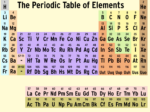Atoms Lesson Plan: Matter and its Interactions
*Click to open and customize your own copy of the Atoms Lesson Plan.
This lesson accompanies the BrainPOP topic Atoms, and supports the standard of developing models to describe the atomic composition of simple molecules. Students demonstrate understanding through a variety of projects.
Step 1: ACTIVATE PRIOR KNOWLEDGE
Display an image of the periodic table of elements, like this one:
Ask students:
- What do you think all of the elements are made of?
- Which elements are you familiar with? What do you know about them?
Step 2: BUILD KNOWLEDGE
- Read the description on the Atoms topic page.
- Play the Movie, pausing to check for understanding.
- Have students read one of the following Related Reading articles: “Did You Know?” or “Gadgets.” Partner them with someone who read a different article to share what they learned with each other.
Step 3: APPLY and ASSESS
Students take the Atoms Challenge and Quiz, applying essential literacy skills while demonstrating what they learned about this topic.
Step 4: DEEPEN and EXTEND
Students express what they learned about atoms while practicing essential literacy skills with one or more of the following activities. Differentiate by assigning ones that meet individual student needs.
- Make-a-Movie: Create a guided tour of the periodic table of elements that answers this question: How can you use the periodic table to learn about each element’s atomic make-up?
- Make-a-Map: Make a concept map describing the atomic makeup of a specific molecule, like water or salt. Identify the parts of each atom in the molecule.
- Creative Coding: Code a sorting game challenging players to determine whether information describes protons, neutrons, or electrons.
- Primary Source Activity: Analyze John Dalton’s papers about atomic theory, and cite details to answer accompanying questions.
More to Explore
Sortify: Periodic Table of Elements: Play an interactive sorting game.
Related BrainPOP Topics: Deepen understanding of atoms with these topics: Periodic Table of Elements, Atomic Model, and Ions.
Teacher Support Resources:
- Pause Point Overview: Video tutorial showing how Pause Points actively engage students to stop, think, and express ideas.
- Learning Activities Modifications: Strategies to meet ELL and other instructional and student needs.
- Learning Activities Support: Resources for best practices using BrainPOP.












